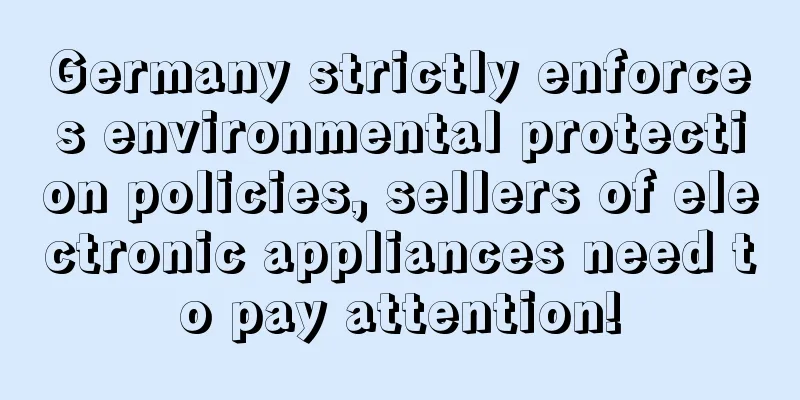Germany strictly enforces environmental protection policies, sellers of electronic appliances need to pay attention!

|
According to the European Commission, the newly revised battery regulations WEEE will continue to be implemented in the European market. Germany has always attached great importance to environmental protection issues and will strictly implement the electronic product battery recycling policy starting in 2021.
WEEE stands for Waste Electrical and Electronic Equipment, which is the EU Directive on Waste Electrical and Electronic Equipment. Its main purpose is to prevent the generation of electronic waste, facilitate waste recycling and reuse, including other forms of remanufacturing, reduce resource waste, and improve the efficiency of electronic equipment. Manufacturers need to design environmentally friendly products that comply with the EU RoHS Directive.
Germany stipulates that any company that produces, sells, advertises in Germany, or exports electronic products to Germany must complete registration with the German EAR (German Electrical Appliance Registration Office) Foundation and obtain a WEEE registration code before it can conduct related business on the German platform.
Amazon also announced that electronic and electrical products sold on the German platform must have relevant registration codes, and cross-border e-commerce products without WEEE registration codes will be forced to be removed from the shelves. The e-commerce platform will strictly enforce the regulations. Once the German EAR Foundation finds that a merchant has violated the law, the seller will face a huge fine, and the profit income of the illegal product in Germany will be confiscated.
Products that require WEEE registration include the following categories:
IT and communication equipment; large household appliances; small household appliances; consumer electronic and electrical equipment; lighting equipment; medical equipment; toys, leisure and sports equipment; testing and monitoring instruments, etc.
The WEEE registration process is as follows:
The seller submits an application to the German EAR Foundation; The Foundation issues a contract and fee details, and the seller confirms the formal quotation issued later and pays the fee; Waiting for the case acceptance letter; Once the registration is successful and the German EAR audit is passed, you can obtain the WEEE code.
At the beginning of the new year, Germany will further strictly enforce the regulations on e-commerce platforms. Generally speaking, it takes 10 to 12 weeks to complete WEEE registration on the German site . Sellers on e-commerce platforms need to pay special attention to understand the qualification certification and other related matters required for export products and prepare the WEEE registration code in advance. Cross-border e-commerce market Germany Electrical appliances |
<<: Search volume surges 120%! Indonesia's Google's annual hot search results
>>: Cdiscount platform fined nearly 1 million euros for missing 988,432 order information
Recommend
Amazon sends random warnings? Big sellers are threatened with account closure
Recently, the editor saw a big Amazon seller on T...
ChatGPT banned accounts on a large scale, sellers: trial cards expired!
From sellers to logistics companies, from writing...
The $57 billion market is coming! Amazon's electronics category is about to explode
As one of the world's largest e-commerce plat...
Major US footwear DTC brands grew 33% in Q3 to $62.7 million!
According to the latest news, Allbirds, a major A...
The parent company has nearly 200 million yuan in outstanding debts, and part of Youkeshu’s equity may be sold off
In recent years, the domestic cross-border e-comm...
What is Yiya Cross-border Supply Chain? Yiya Cross-border Supply Chain Review, Features
EasyYa was established in April 2020 by EasyNet In...
Amazon's e-commerce sales fell 4%, and the real economy is recovering
Amazon's own online store sales fell 4% in th...
What is Auto Trader? Auto Trader Review, Features
Auto Trader is the largest digital automotive mar...
A hot-selling new brand was exposed, eyeing this track
In the cross-border circle, Beijing-based Hanwang...
The delivery industry will reduce disposable items! Tableware may be a big seller in Korea
Korean Delivery Nation and Coupang-Itsu announced...
What is Hypr? Hypr Review, Features
Hypr built a tool to redefine the influencer indu...
What is DailyPay? DailyPay Review, Features
DailyPay is a financial services company that pro...
What is Order Time? Order Time Review, Features
Order Time is a QuickBooks Gold Partner and the le...
What is Lefties? Lefties Review, Features
Lefties is a direct-sale store of Zara and other h...
Wildberries cancels storage fees for sellers
Russian e-commerce platform Wildberries has cance...









